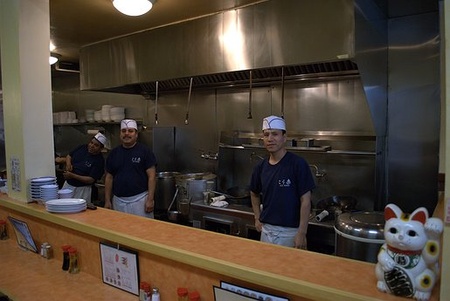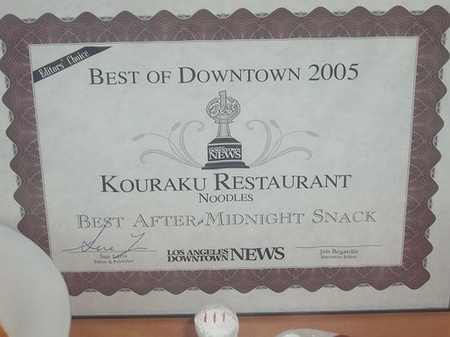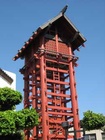Koraku Japanese Restaurant opened in 1976 on 2nd Street in Little Tokyo and was the first Japanese ramen noodle restaurant in the United States. Although one notices several other ramen establishments in the area, some of which insist that they were the first ramen restaurant in America, Koraku’s proprietor, Mr. Hiroshi Yamauchi, hastily sets the record straight whenever the question arises. Mr. Yamauchi, who arrived in the United States in 1976 to study English, spent only ten years in the United States before purchasing Koraku with a friend in 1986 and has been the proud owner ever since. Mr. Yamauchi sees Koraku’s menu as an important factor in distinguishing it from other restaurants in Little Tokyo because it is eclectic and offers a variety of authentic Japanese dishes going beyond just sushi and ramen.
Koraku plays an important role in the Japanese community in Los Angeles and is patronized by Japanese Americans from all over the Los Angeles area. Koraku’s following has grown over the decades to include diners of all backgrounds, but Japanese Americans were the first to embrace the restaurant. Chinese and Korean Americans soon followed many of the Japanese patrons and began to frequent Koraku as well. Mr. Yamauchi takes pride in providing diners with an authentic experience of Japanese culture, from the constantly evolving recipes that his chefs prepare to the interactions that he has with his customers. Ramen noodles are a distinctly Japanese dish that Mr. Yamauchi’s chefs continuously try to improve through experimentation with new sauces and seasonings. Koraku’s head chef is Japanese and Mr. Yamauchi employs about 24 people, some of whom are also of Japanese ancestry. Celebrities from both the United States and Japan often dine at Koraku, which attests to its growing following and increasingly well-known reputation. One major celebrity, John Travolta, was a frequent diner during the 1980’s, and Mr. Yamauchi recalls his limousine pulling up to the curb outside the restaurant.
Unfortunately, Japanese tourism in the United States has decreased significantly since the early 1990’s in the wake of the Rodney King riots, which painted Los Angeles as a dangerous, violent place to visit. Koraku was spared any physical damage during the riots, but business did slump for a period during and after the riots. The perception of Los Angeles as a less than desirable vacation destination, coupled with Japan’s nearly two decade long economic malaise, has caused the demographics at Koraku to shift from mostly Japanese patrons to many Caucasians and those of other backgrounds.
Mr. Yamauchi and Koraku maintain a strong presence in the Little Tokyo community through membership in a variety of neighborhood organizations. Mr. Yamauchi is a director of the Little Tokyo Business Association (LTBA), which serves an important role in supporting local businesses and the community at large. The LTBA undertakes activities that are beneficial to many of Little Tokyo’s establishments, which include raising funds to bolster security in the business district and to support other neighborhood organizations. Mr. Yamauchi proudly notes that the LTBA supports Nisei Week, which is a festival honoring second generation Japanese Americans and Japanese culture at large. The festival includes a variety of competitions, exhibitions and performances that take place in Little Tokyo. The 2010 Nisei Week will take place from August 14th to 22nd. As a sign of Little Tokyo’s changing demographics, Mr. Yamauchi points out that a number of Korean business owners have joined the LTBA in recent years and are contributing to the life of the neighborhood. Koraku is also part of the Japanese Restaurant Association of Southern California, which is headquartered in Little Tokyo, puts on an annual Japanese Food Festival and provides a variety of resources for its members. During the crime wave that hit Little Tokyo in decades past, Mr. Yamauchi chose to join the neighborhood watch and take a stand protecting his fellow citizens. Fortunately Little Tokyo’s major crime problems have disappeared and Mr. Yamauchi has since retired from the neighborhood watch.
Since Koraku is open until 3:00am, it has become a popular spot for late-night dining in the downtown area. In 2005 Los Angeles Downtown News awarded Koraku the title of “Best After Midnight Snack” for their delicious offerings. The fact that Koraku is open so late greatly increases the number of people who choose to dine there and helps further Mr. Yamauchi’s goal of sharing Japanese culture with the community. Given Little Tokyo’s proximity to the University of Southern California, more and more young people are going to Koraku. The arrival of the student population means that Koraku’s clientele is continuing to diversify and increase in number, which Mr. Yamauchi embraces. Another one of Koraku’s noteworthy aspects is its affordable menu and generous portions that allow people to enjoy great Japanese food without breaking the bank.
Mr. Yamauchi takes tremendous pride in both his restaurant and in its contributions to the Little Tokyo community, as well as the city of Los Angeles. The friendly and talented staff provides an enjoyable dining experience for their patrons, while exposing them to Japanese culture in a welcoming manner. Anyone looking for a delicious meal and a taste of Japan should try dining at Koraku.
* Discover Nikkei partnered with Professor Morgan Pitelka of Occidental College and his students taking the Spring 2010 seminar “Japanophilia: Orientalism, Nationalism, Transnationalism” on a meaningful community-based documentation project. The students interviewed owners of five long-time Little Tokyo businesses to create Nikkei Albums and articles.
View the Nikkei Album: Koraku Japanese Restaurant 314 East 2nd Street
© 2010 Alexander LaRose





